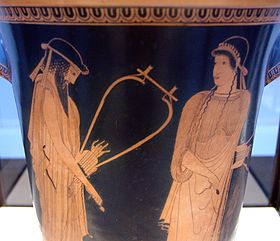Alcaios of Lesbos

Alkaios (Greek Ἀλκαῖος, Latinized Alcaeus ; * around 630 BC in Mytilene on Lesbos ; † around 580 BC) was an ancient Greek poet and, alongside his contemporary Sappho, the most important exponent of Aeolian lyrical poetry. He belongs to the Alexandrian canon of the nine lyric poets .
Life
Alkaios was born around 630 BC. Born in Mytilene, the most important city on Lesbos. His family belonged to the aristocratic upper class and participated in local politics, with Alcaios also participating in the struggles against tyranny (for an aristocracy). The involvement of individual family members in the resistance against the tyrants Melanchros and Myrsilus was probably the reason for his exile in Egypt.
When he wanted to force a return to Lesbos with his allies, he fell into the hands of the new ruler Pittakos . After being reconciled with Pittakos, one of the Seven Wise Men , he was able to stay on Lesbos, where he lived around 580 BC. BC died.
The Alkean stanza , a four-line stanza measure, is named after Alkaios .
He is also the namesake for the asteroid (12607) Alcaeus .
Works
His work, love songs, drinking songs and hymns, has only survived in fragments and as quotations (the Alexandrian edition of the work comprised 10 books). Alkaios often used mythological figures in his poems, for example he described Helena as “a plague for the Greeks”, in another she is contrasted with the chaste Thetis (fragment 44 LP). A specialty in dealing with mythology is a kind of narrative poem that is apparently not told as an example but for the sake of history, cf. z. B. Fragment 298 LP on Ajax and Kassandra. In his hymns he sings about a. the Olympian gods (Apollon, Hermes etc.). The so-called stasiotika ("battle songs") are directed against the lone rulers of Lesbos (Myrsilos, later Pittakos). Life in exile is also discussed. His ship poems are famous, at least some of which can be interpreted as allegorical in the sense of a "ship of state" (for which there is already ancient evidence, cf. 306 LP).
|
The state ship
|
expenditure
- D. Campbell: Greek Lyric I ( Loeb Vol. 142), 2nd edition 1990 (text and English translation)
- Edgar Lobel , Denys Lionel Page : Poetarum Lesbiorum Fragmenta . Oxford 1955 (standard edition from which the fragments of Sappho and Alkaios are quoted)
- Alcaios. Greek and German. Edited by Max Treu . 3rd edition, Munich 1980, ISBN 3-7765-2002-7
- Jan Maarten Bremer , Anna Maria van Erp Taalman Kip , Simon R. Slings (Eds.): Some Recently Found Greek Poems. Text and Commentary (= Mnemosyne . Supplementum 99). Brill, Leiden / New York 1987, ISBN 90-04-08319-7 , pp. 95–127 ( Aias and Kassandra )
literature
- Andreas Bagordo : Alkaios . In: Bernhard Zimmermann (Hrsg.): Handbook of the Greek literature of antiquity , Volume 1: The literature of the archaic and classical times . CH Beck, Munich 2011, ISBN 978-3-406-57673-7 , pp. 208-213
- Hermann Fränkel : Poetry and philosophy of the early Greek culture. 5th edition, CH Beck, Munich 2006, ISBN 3-406-37716-5 , pp. 214-228
- Wolfgang Rösler : poet and group. An investigation into the conditions and the historical function of early Greek poetry using the example of Alkaios. Munich 1980.
Web links
- Otto Crusius : Alkaios 9 . In: Paulys Realencyclopadie der classischen Antiquity Science (RE). Volume I, 2, Stuttgart 1894, Col. 1498-1505.
- Literature by and about Alcaios of Lesbos in the catalog of the German National Library
- Bilingual text selection on the Greek poets with additional help
| personal data | |
|---|---|
| SURNAME | Alcaios of Lesbos |
| ALTERNATIVE NAMES | Alcaeus |
| BRIEF DESCRIPTION | ancient Greek poet |
| DATE OF BIRTH | around 630 BC Chr. |
| PLACE OF BIRTH | Mytilene on Lesbos |
| DATE OF DEATH | around 580 BC Chr. |
| Place of death | Lesbos |